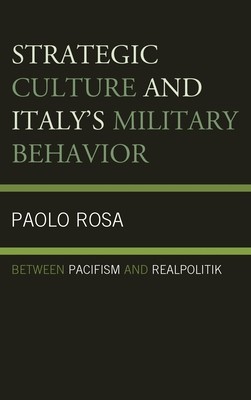
- We will send in 10–14 business days.
- Author: Paolo Rosa
- Publisher: Lexington Books
- ISBN-10: 1498522815
- ISBN-13: 9781498522816
- Format: 15.8 x 23.1 x 1.8 cm, hardcover
- Language: English
- SAVE -10% with code: EXTRA
Reviews
Description
Italy, although it considers itself to be a middle-sized power on par with France, the United Kingdom, and Germany, has been incapable of playing an international role comparable to theirs, instead keeping a low-profile foreign policy. This has not been due to any material constraints-Italy's profile has remained consistently low, through economic times both good and bad-but rather to the country's strategic culture, a mixture of realpolitik and pacifist tendencies. This book sets out to analyze the influence of Italy's strategic culture on its foreign policy. It conducts an exploratory case study to show if hypotheses generated by the strategic culture approach can shed some light on the puzzling Italian behavior in the international arena (puzzling because Italy shows a less assertive foreign policy vis-Ã -vis other middle powers in the same rank). The first chapter considers the main interpretations of Italian foreign policy and their limitations. The second and third chapters review the literature on strategic culture, stressing its utility for the Italian case. The fourth chapter describes the country's strategic culture through the Liberal, Fascist, and Republican periods, and the fifth chapter analyzes the influence of ideational factors on Italy's behavior abroad. Conclusions sum up the various emerging evidences. Scholars of political science, international relations, strategic studies, and comparative politics will find this work to be of interest.
EXTRA 10 % discount with code: EXTRA
The promotion ends in 19d.23:46:41
The discount code is valid when purchasing from 10 €. Discounts do not stack.
- Author: Paolo Rosa
- Publisher: Lexington Books
- ISBN-10: 1498522815
- ISBN-13: 9781498522816
- Format: 15.8 x 23.1 x 1.8 cm, hardcover
- Language: English English
Italy, although it considers itself to be a middle-sized power on par with France, the United Kingdom, and Germany, has been incapable of playing an international role comparable to theirs, instead keeping a low-profile foreign policy. This has not been due to any material constraints-Italy's profile has remained consistently low, through economic times both good and bad-but rather to the country's strategic culture, a mixture of realpolitik and pacifist tendencies. This book sets out to analyze the influence of Italy's strategic culture on its foreign policy. It conducts an exploratory case study to show if hypotheses generated by the strategic culture approach can shed some light on the puzzling Italian behavior in the international arena (puzzling because Italy shows a less assertive foreign policy vis-Ã -vis other middle powers in the same rank). The first chapter considers the main interpretations of Italian foreign policy and their limitations. The second and third chapters review the literature on strategic culture, stressing its utility for the Italian case. The fourth chapter describes the country's strategic culture through the Liberal, Fascist, and Republican periods, and the fifth chapter analyzes the influence of ideational factors on Italy's behavior abroad. Conclusions sum up the various emerging evidences. Scholars of political science, international relations, strategic studies, and comparative politics will find this work to be of interest.


Reviews